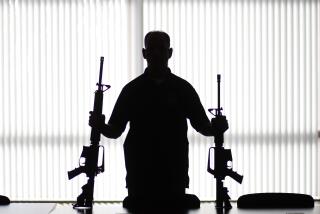He Gets Paid to Chase Down the Product Counterfeiters
- Share via
Find J.F.
That’s all Santa Ana private investigator Ian Sitren had to go on when John Paul Mitchell Inc. called on him to try to stop whoever was trying to clone the company’s shampoo and conditioner.
The case seemed like a dead--or, at least, split--end.
But Sitren was up to the challenge.
Sitren, 49, is part of a small but increasingly prosperous group of private investigators who specialize in cases of consumer product counterfeiting and corporate espionage.
Soft-spoken, with a studious face and a penguin’s posture, he hardly resembles the hard-bitten shamus familiar from movies.
But Sitren’s clients--which have included Procter & Gamble Co. and Colgate-Palmolive Co.--need a gumshoe who can outsmart, not out-muscle, today’s white-collar thieves.
“Ian’s dogged,” said Michaeline Re, chief legal officer for John Paul Mitchell, which has a factory in Saugus. “He knows our business, he knows the players. He gets onto something and he sticks to it.”
Product tampering, counterfeiting and diversion have escalated in the last 10 years, making investigators such as Sitren increasingly vital corporate accessories.
U.S. companies lose $200 billion a year just to counterfeiting, according to the International AntiCounterfeiting Coalition, a corporate trade group that has tracked product fakery since 1978.
Companies turn to these private investigators to tackle commercial complaints too sensitive for public disclosure or too time-consuming and complex for police.
“Big companies don’t want to rely on the uncertainty of walking into a police department and hoping someone will care about their problem,” said Los Angeles County Deputy Dist. Atty. William Clark.
Companies use material gathered by private investigators to gain court orders yanking bogus products from store shelves or stopping competitors from using stolen ideas.
In criminal cases, private investigators typically approach police when they have enough information to back up a search warrant, Clark said. Law enforcement then takes over assembling the case, but the private investigators often serve as their primary witnesses.
To Sitren, the cases are about more than money. Product counterfeiters endanger companies’ reputations and consumers’ lives by putting unsafe, untested products on the market, often under the most reliable of brand names.
“It’s about trust and betrayal,” he said. “It’s about all the work people put into their products over many years.”
Sitren entered the investigations field in his early 20s, convinced that his research skills would make him a good sleuth.
He approached an established private investigator who offered to teach him the business. After a couple of years of handling “whatever walked in the door,” Sitren hung out his own shingle.
In the ‘80s, he graduated from missing-person and divorce cases to bounty hunting for bail bondsmen, skulking outside seedy apartments and handcuffing himself to bad guys.
But ultimately, Sitren tired of living case to case. His 1987 personal bankruptcy drove home the precariousness of never knowing where his next fee would come from.
He also realized that companies’ notions of loss prevention were changing, that they were combating insidious new threats that security guards and fences could not keep out.
“People don’t steal typewriters and drills anymore,” Sitren said. “They steal Zip disks,” computer disks that can store mounds of sensitive data.
Most private investigators still specialize in criminal defense or insurance-related work, said Sharon Hilke, executive director of the California Assn. of Licensed Investigators.
But Fortune 500 companies now spend an average of $2 million to $4 million a year to prevent counterfeiting, theft and subterfuge, a recent study by the International AntiCounterfeiting Coalition showed.
Much of that goes to about 20 large firms, but the work has become lucrative enough to support solo practitioners such as Sitren.
“What I’ve seen is a maturation of the business,” said Vaughn Volpi, president of PICA Corp. of Tampa, Fla., the niche’s biggest player. “Companies cooperate more on investigations, sharing costs. You can’t eradicate this stuff, but you can make a significant dent.”
Many firms have their own internal security squads but use private investigators to do the legwork and to provide expertise on the gray market.
Industry-based Joico Laboratories Inc., which makes hair-care products sold exclusively in salons, has a four-member security team, but it hires Sitren to handle local investigations and a Houston-based firm to handle interstate and international work.
Sitren works cases alone from his home, hiring help when necessary and leaving pitches to potential clients to his marketing partner.
In the upstairs room that houses the headquarters of his Integrity Services International Inc., Sitren sits amid a mountain of gear.
He pulls out a video lens that looks like a beeper and one of those lipstick-sized still cameras used in spy movies. He shows off a tray full of electronic bugs that he has pulled from clients’ offices.
“Found that one behind a water heater,” he says, pointing to a cookie-sized blob of melted black plastic and wire. “The ones we find now are the size of a fingernail.”
In one corner sits a trophy case of sorts, containing fake and diverted products he has recovered: perfume, baby formula, even potato chips.
He has packaging material taken from a man who attempted to market a toothpaste called “Close-gate”--a little too close to Colgate for Colgate-Palmolive’s taste.
He picks up a bottle of bogus baby shampoo from a shipment he tracked down for Personal Care Products Inc. of Bingham Falls, Mich.
“Look at the gunk in there,” he said. “It had a bacterial count higher than human feces.”
Even without a badge, Sitren has ways of making people talk.
“I’ll take out a pad and say to the guy, ‘I go around making lists. I make a list of witnesses,’ ” he said, pausing for a moment to give his next words appropriate menace. “ ‘And I make a list of defendants. You need to decide which one you want to be on.’ ”
Sitren’s favorite assignments involve a bit of drama and disguise.
He recently posed as a potential buyer to snare three men suspected of stealing their former employer’s software program and selling it themselves. Sitren used a commercial mailbox to establish a business address, set up phone lines, even had business cards printed up.
Sure enough, the three offered him the proprietary computer program.
“I fed them a fairy tale and they swallowed it,” he said, laughing. “I love those cases, the real spy stuff.”
Sitren has about 15 ongoing clients, led by John Paul Mitchell, that supply a steady flow of assignments and monthly billings. He said he generated more than $1 million in revenue last year.
This year, he even helped bring the elusive J.F. to justice.
In 1997, a broker approached John Paul Mitchell’s regular bottle printer and ordered bottles with the signature Mitchell logo. After the printer tipped off Mitchell that someone outside the company wanted to replicate its design, the company summoned Sitren.
Sitren traced the order back to the broker, who gave him J.F.’s initials. Then the broker’s wife remembered a last name to go with them. Thompson.
A weeklong search flushed out Joseph Frederick Thompson on Balboa Island in Newport Beach. Sitren notified the D.A.’s office, but Thompson fled to Central America before charges were filed.
Thompson had sold about $1 million worth of fake Mitchell products to a New York distributor, but Sitren headed them off before they reached store shelves.
Thompson, 33, returned to Los Angeles March 29 and pleaded no contest to a product-counterfeiting charge, opting to take responsibility for his crime, said his lawyer, Joseph Gibbons. He was sentenced to 16 months in prison and ordered to pay $41,500 to cover investigation costs.
“It’s not like television,” Sitren said. “Some of these cases go on for years.”
Sitren tells clients to be on guard against threats from inside the company as well as from outside. He says firms should routinely shred documents and strive to protect and back up their computer files.
“Most of the threats come from within, a disgruntled employee or someone who gets a better offer,” Sitren said. “People can be very unpredictable, especially when it comes to money.”
More to Read
Inside the business of entertainment
The Wide Shot brings you news, analysis and insights on everything from streaming wars to production — and what it all means for the future.
You may occasionally receive promotional content from the Los Angeles Times.










